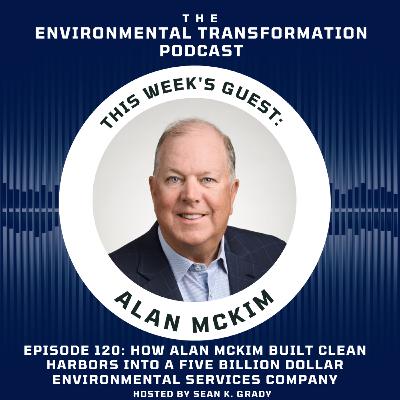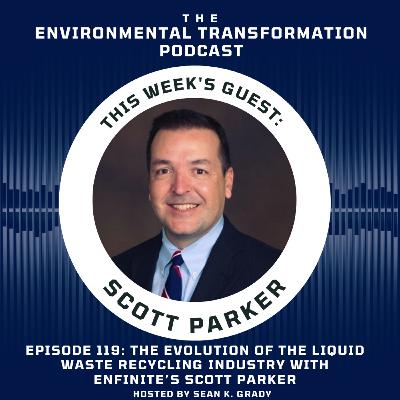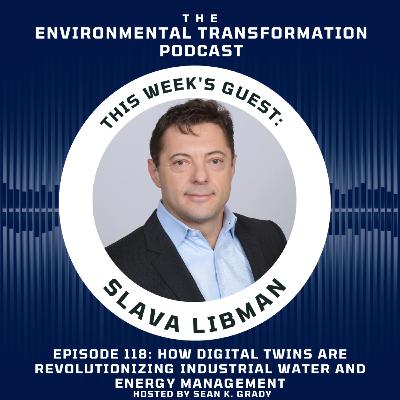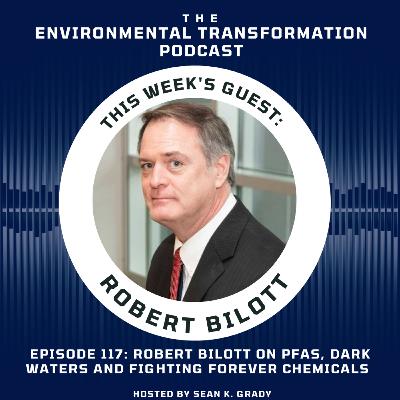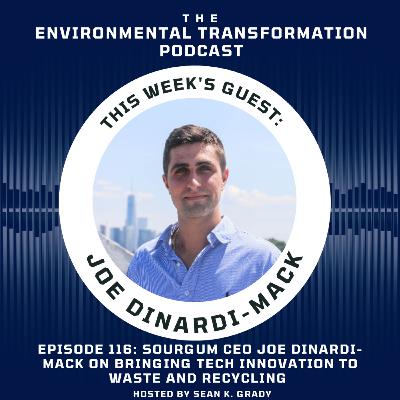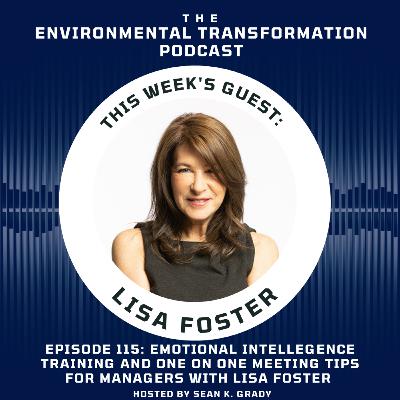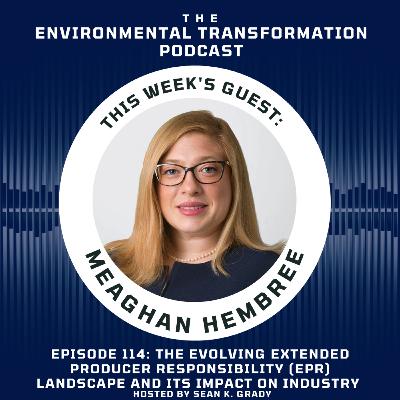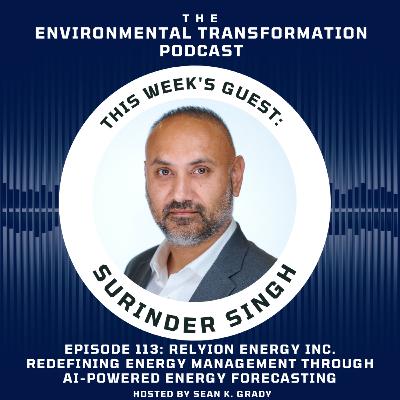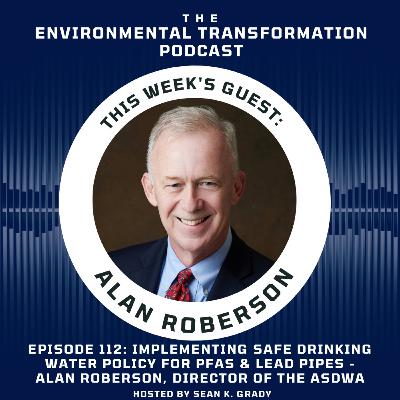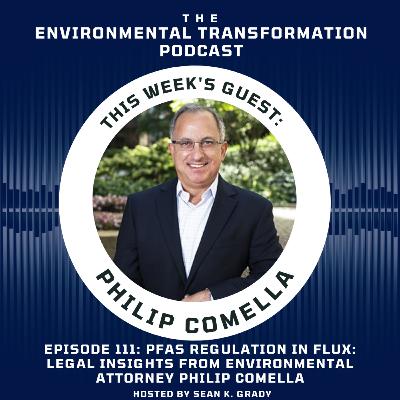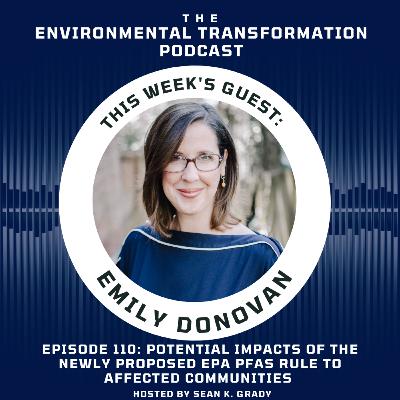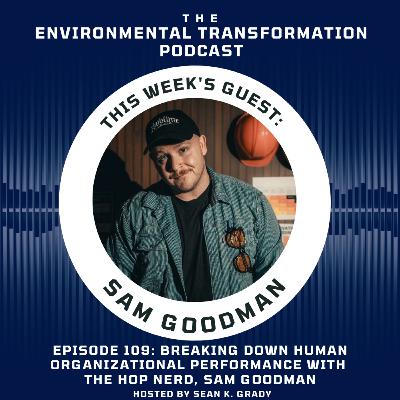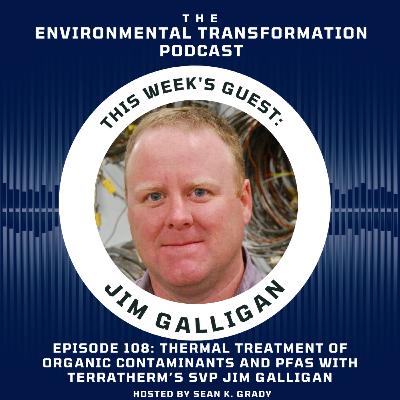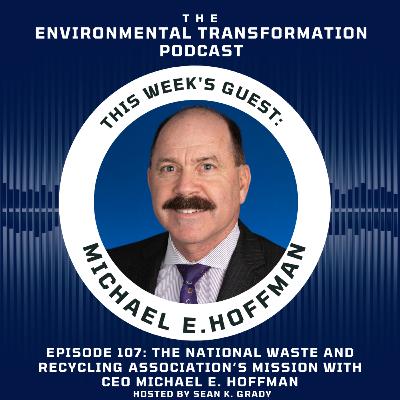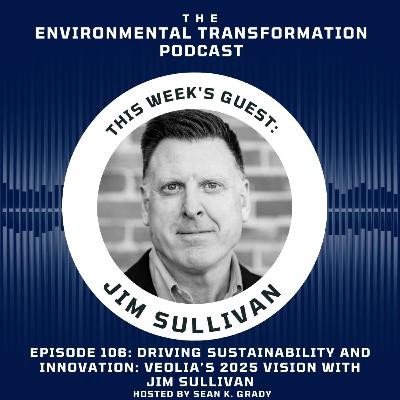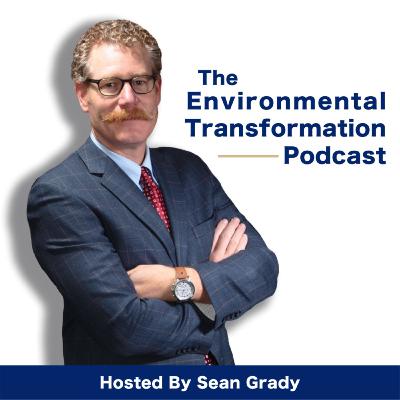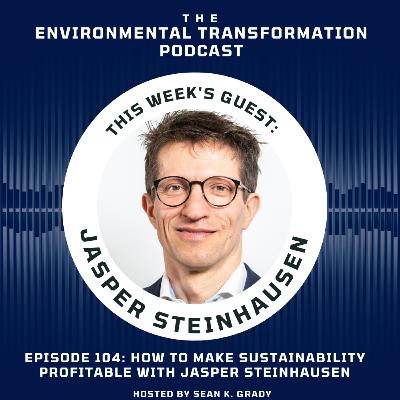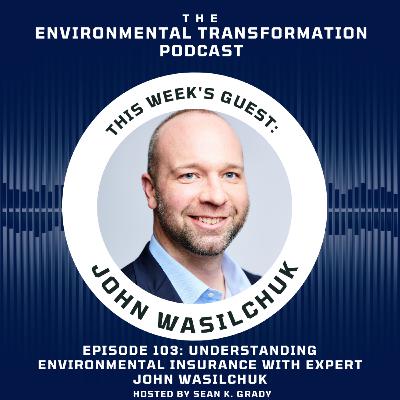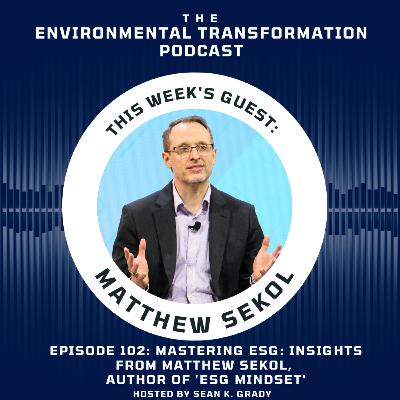Discover The Environmental Transformation Podcast with Sean Grady
The Environmental Transformation Podcast with Sean Grady

The Environmental Transformation Podcast with Sean Grady
Author: Sean Grady
Subscribed: 14Played: 145Subscribe
Share
© Sean Grady
Description
Welcome to one of the top environmental podcasts dedicated to transforming the industry. Hosted by Sean Grady, this podcast brings together the brightest leaders and experts in the field. Whether you're a business leader, environmental health and safety professional, or sustainability practitioner, our episodes provide valuable insights into the latest trends, emerging digital technologies, and industry innovations shaping the future of the environmental sector.
Tune in to discover how the environmental sector is evolving and how you can lead the change. Become part of the ET Nation today!
Tune in to discover how the environmental sector is evolving and how you can lead the change. Become part of the ET Nation today!
120 Episodes
Reverse
Alan McKim, founder of Clean Harbors, joins the Environmental Transformation Podcast to discuss how he grew the company from a four-person startup in 1980 into one of North America's largest environmental and industrial services providers. McKim reflects on early emergency response work, major acquisitions including Safety Kleen, going public during the 1987 crash, and building a nationwide network of 20,000 employees, 10,000 vehicles, 700 service centers, and 100 permitted waste facilities. He also shares insights from his Undercover Boss experience, the role technology plays in Clean Harbors operations, and lessons from his book, “Doing the Doing.”Thanks to our Sponsors: WASTELINQ, E-Tank, and Cascade Environmental
Host Sean Grady welcomes Scott Parker, Executive Director of Enfinite—the Industrial Liquid Recycling Association—to discuss the organization’s rebrand from NORA and its mission to connect, educate, and protect the industrial liquid recycling industry. Parker shares Enfinite’s history, key regulatory advocacy work, challenges like PFAS management and driver shortages, and how members are embracing technology and sustainability.Get more episodes of The Environmental Transformation Podcast for in-depth discussions on environmental leadership and innovation.
Dr. Slava Libman, co-founder and CEO of FTD Solutions, joins host Sean Grady on the Environmental Transformation Podcast to discuss how digital twin technology is transforming industrial water and energy use. Libman shares FTD’s origin story, explains how digital twins help facilities optimize performance and reduce costs, and explores their impact on sustainability and ESG goals. He also covers real-world applications in semiconductor manufacturing, collaboration through SEMI and IRDS, and how AI and data analytics are shaping the future of industrial efficiency.Thanks to our sponsors: Cascade Environmental, E-Tank, and WASTELINQ
Host Sean Grady interviews attorney Robert Bilott live from the AHMP EHS Hazmat Summit in Louisville, Kentucky. Bilott, the lawyer whose work inspired the film Dark Waters, shares his decades-long fight against DuPont over PFAS contamination, the failures of early chemical disclosure, and the challenges of pushing the EPA to regulate forever chemicals. He discusses his book Exposure, the ongoing litigation nationwide, the impact on water utilities and ratepayers, and how consumer demand is forcing change. Bilott also explains how states like New Jersey and Minnesota are leading regulation, the global scope of PFAS contamination, and the need for new technology and laws to address the crisis.Thanks to our Sponsors: Cascade Environmental, E-Tank, and WASTELINQ
Sourgum co-founder and CEO Joe DiNardi-Mack shares how his team is using technology, AI, and data analytics to modernize the waste and recycling industry. He discusses scaling a nationwide waste management platform, supporting local haulers, improving routing and diversion rates, and offering enterprise waste solutions. Topics include waste management software, recycling technology, sustainability strategies, startup growth, Series A funding, and building an operating system for waste services across the U.S.Thanks to our Sponsors: WASTELINQ, E-Tank, and Cascade Environmental
Lisa Foster is a business coach, speaker, and author of Bag Lady: How I Started a Business for a Greener World and Changed the Way America Shops. In this episode of the Environmental Transformation Podcast, host Sean Grady talks with Lisa about her journey founding 1 Bag at a Time, Inc., one of the first reusable grocery bag companies in the U.S., and how she scaled it to sell millions of bags. Lisa shares insights on leadership, emotional intelligence, and building high-performing teams. She also previews her free one-hour training on one-on-one meetings and her upcoming six-week leadership series.To receive at 20% discount on Lisa's Leadership Essentials course starting September 24, 2025, sign up here!https://calendly.com/lisadfoster/leadership-essentials-group-coaching-series-cloneThanks to our sponsors: Cascade Environmental, E-Tank, and WASTELINQ.
In this episode of the Environmental Transformation Podcast, host Sean Grady talks with Meaghan Colligan Hembree, Environmental, Compliance & Disputes Partner at Holland & Knight in Washington, D.C. She counsels Fortune 500 companies and global brands on chemical risk, environmental compliance, and high-stakes disputes.Hembree explains extended producer responsibility (EPR) laws, how they affect packaging, plastics, recycling, and supply chains, and what companies must do to prepare for compliance across states and globally. The discussion also covers the China waste import ban, circular economy challenges, and the future of recycling infrastructure.00:00 Why Recycling Needs a National Approach01:13 Meet Megan Colligan Hembry: EPR Legal Expert02:25 EPR Explained: Extended Producer Responsibility04:54 The 2018 Turning Point & Policy Responses07:19 Industry's Struggle: Adapting to China’s Ban11:39 How Companies Organize for EPR Compliance13:38 Packaging, Supply Chains, and Regulatory Complexity16:14 Operational Challenges Inside EPR Programs18:46 EPR’s Impact on Product and Package Design21:24 Data Collection & Reporting Complexities24:50 Making Packaging Truly Recyclable28:12 Beyond Packaging: Tires, Batteries & Other EPR Products32:48 Does EPR Drive Innovation and Sustainability?35:47 Federal vs State EPR: Who Should Take the Lead?40:19 RCRA, Universal Waste, and Circular Economy Paths45:47 Will EPR Raise Prices? Costs, Consumers & Fairness50:03 Will EPR Actually Improve Recycling for Consumers?52:00 Why Systematic Recycling Education Matters54:34 Making Recycling Trendy & Accessible55:40 Closing Thoughts & Outlook on EPR and SustainabilityOpvTDfEuhQpfjN4UpcG5
Host Sean Grady interviews Dr. Surinder Singh, CEO and co-founder of Relyion Energy Inc. Dr. Singh explains how his company is reshaping energy management through AI-driven forecasting, energy management systems (EMS), and battery management systems (BMS). He shares the story behind Relyion's technology, how it extends battery life up to 20 years, and why utility-scale clients, data centers, and commercial operators are turning to their solutions for smarter, more efficient energy usage. Learn how Relyion outperformed traditional forecasting tools by 13x in ERCOT and why now is the right time to adopt these game-changing innovations.Chapters:00:00 – Introduction to Dr. Surinder Singh and Relyion Energy02:13 – The Three Pillars: Forecasting, EMS, and BMS07:25 – Extending Battery Life Beyond 20 Years12:40 – Relyion’s Early Use of Recycled EV Batteries16:50 – Transitioning from Product Demonstration to Platform Innovation21:30 – Minimal-Invasive Technology and Deployment Flexibility24:42 – Beating Traditional Forecasting Models: PG&E and ERCOT Case Studies29:58 – The Power of Forecasting + EMS for Grid Efficiency34:22 – Grocery Store Case Study: ROI in Under 3 Years38:09 – EV Charging, Microgrids, and Peak Shaving Optimization41:32 – Battery Agnosticism and Real-Time Adaptation48:40 – Implementation Timeline and Customer Onboarding53:01 – Cloud-Based Forecasting and Edge AI Hardware56:11 – Commercial Growth and Market Expansion59:55 – Relyion’s Holistic Approach vs. Siloed Competition1:03:05 – Utility Design and Grid Planning Applications1:05:28 – Gen AI and New Demands on the Grid1:07:20 – How to Connect with Relyion Energy🔗 Learn more: https://www.relyionenergy.com📧 Contact: contactus@relyionenergy.com#EnvironmentalTransformation #EnergyAI #BatteryTech #UtilityGrid #Sustainability #CleanTech #DrSurinderSingh #RelyionEnergy #PodcastChapters
In this episode of the Environmental Transformation Podcast, host Sean Grady talks with Alan Roberson, Executive Director of the Association of State Drinking Water Administrators (ASDWA). Roberson shares insights from over 34 years in water policy, including how ASDWA supports state drinking water agencies, challenges of PFAS regulation, and the impact of federal funding shortfalls on public health protection. The discussion covers drinking water regulations, the role of state labs, infrastructure funding, workforce shortages, and more.Chapters with Timestamps:00:00 – Introduction and Guest Background02:12 – What Is ASDWA and Its Mission04:33 – ASDWA’s Role in Federal Rulemaking07:05 – PFAS Regulation Updates and Compliance Timelines13:42 – State Data Sharing and Collaboration18:20 – Concerns Over GenX and Short-Chain PFAS22:01 – Cost of Compliance and Affordability26:44 – Federal Funding Gaps and SRF Limitations31:10 – Holding Polluters Accountable34:40 – State-Level PFAS Standards and Support38:02 – Lab Testing Capacity and State Limitations42:35 – Lead Pipe Inventories and Replacement Challenges46:10 – Regulatory Burdens and Ratepayer Equity49:20 – Infrastructure Needs and Workforce Challenges54:00 – ASDWA’s Top Priorities for 202557:30 – Final Thoughts and ClosingPFAS drinking water rule, Safe Drinking Water Act, lead pipe replacement, Alan Roberson, ASDWA, EPA drinking water standards, public health and water utilities, SRF funding, UCMR5, GenX chemicals, state drinking water labs, water infrastructure, environmental policy, clean water initiatives, water workforce shortage, environmental transformation podcast
Veteran environmental attorney Phil Comella joins host Sean Grady on the Environmental Transformation Podcast to break down the EPA’s proposed rollback of PFAS drinking water regulations. With over 40 years of experience, Comella offers expert legal insight on how the delayed compliance deadlines, potential MCL reductions, and CERCLA implications could affect municipalities, water utilities, waste management companies, and communities already exposed to PFAS. The conversation covers legal risks, scientific uncertainty, and the regulatory gaps that complicate cleanup and accountability.Thanks to our sponsors: Cascade Environmental, E-Tank, and WASTELINQ📍 Chapters:0:00 – Introduction and Phil Comella’s background2:42 – What the EPA’s PFAS proposal actually means6:30 – Delays, politics, and public health impact10:10 – Why the proposed changes matter for communities14:50 – Legal risk for utilities, ratepayers, and manufacturers19:25 – Superfund and the challenge of hazardous substance listings24:40 – The case for a dedicated PFAS statute28:35 – Wastewater treatment, landfills, and managing leachate33:45 – PFAS in household products and regulatory blind spots38:50 – Exposure, science, and tort law consequences44:25 – Thoughts on the path forward for EPA regulation50:00 – Dark Waters, science-based policy, and legal legacy🧪 Get expert legal context on one of today’s most pressing environmental health challenges.
Emily Donovan of Clean Cape Fear returns to the Environmental Transformation Podcast to discuss the EPA’s proposed rollback of the PFAS drinking water rules and how it potentially could impact contaminated communities like hers in North Carolina. Host Sean Grady explores the legal, regulatory, and public health stakes behind the EPA’s May 14 announcement, with Donovan providing on-the-ground insight into the movement to hold polluters accountable, protect public drinking water, and stop PFAS exposure. Thanks to our Sponsors: Cascade Environmental, E-Tank, and WASTELINQ📍 Chapters:0:00 - Intro and Emily Donovan returns2:05 - Clean Cape Fear’s 8-year mission6:40 - PFAS origins and EPA rule rollback10:10 - Anti-backslide concerns and regulatory uncertainty17:15 - Public health risks of short-chain PFAS22:00 - Who pays for clean water? Utilities, polluters, or the public27:50 - Legal action and transparency challenges32:10 - National awareness and the role of media38:45 - Partnerships with advocates like Mark Ruffalo and Keen43:10 - Final thoughts: Doing what’s right for communities🎧 Listen, learn, and join the “little army of goodness” working to end PFAS contamination.
Welcome to the Environmental Transformation Podcast with your host, Sean Grady. In this high-impact episode, we’re joined by Sam Goodman, also known as The HOP Nerd—a leading voice in Human and Organizational Performance (HOP), safety culture innovation, and host of The HOP Nerd Podcast.🎙️ In This Episode:Sam breaks down what HOP (Human and Organizational Performance) really means, why traditional safety programs often fall short, and how organizations can shift from blame-based models to system-level improvements that foster real operational learning, psychological safety, and frontline employee engagement.🧠 Topics We Cover:What is Human and Organizational Performance (HOP)?How HOP differs from traditional safety programsThe dangers of TRIR (Total Recordable Incident Rate) obsessionWhy blame, shame, and retrain doesn't workMoving from “who failed?” to “what failed?”How leadership response shapes safety cultureUsing comedy and storytelling to drive cultural changeThe origins and mission of The HOP NerdDownloadable video resources for safety meetings🔑 Key Takeaways for Safety Professionals & Leaders:Stop focusing on just injury metrics—start listening to workers.Safety isn’t the absence of incidents—it’s the presence of capacity to fail safely.Silence in an organization is dangerous—learn how to create environments where truth-telling is encouraged.Good safety culture starts with curious, calm leadership responses.🔥 Whether you're in EHS leadership, a frontline worker, or just tired of meaningless checklists, this episode gives you the tools and mindset shift you need to create sustainable safety transformation.📌 More from Sam Goodman — The HOP NERD:🌐 https://www.thehopnerd.com🎧 The HOP Nerd Podcast – Available on all major platforms📺 Safety satire videos & learning tools: The HOP Nerd YouTube Channel👷♂️ Who is Sam Goodman?Sam is a HOP practitioner, speaker, consultant, and podcast host who brings humor, insight, and real-world experience to the conversation about modern safety systems. His work is deeply influenced by leaders like Todd Conklin and Sidney Dekker, but his approach is distinctly his own—bold, funny, and transformative.🔎 SEO Keywords:Human and Organizational Performance, HOP safety, Sam Goodman HOP NERD, modern safety leadership, safety culture podcast, TRIR criticism, safety differently, safety improvement strategies, frontline safety communication, operational learning, leadership response safety, psychological safety in the workplace, HOP tools, safety performance podcast, environmental transformation podcast📣 Subscribe, rate, and review the podcast to help more safety and environmental professionals discover practical strategies that make a difference!
In this episode, host Sean Grady sits down with Jim Galligan, Senior Vice President at TerraTherm, to discuss advanced thermal remediation technologies. Jim, an industry veteran with over 34 years of expertise, dives deep into thermal conduction heating (TCH), electrical resistance heating (ERH), and steam-enhanced extraction (SEE)—powerful techniques used to remediate recalcitrant contaminants like PFAS, chlorinated solvents (PCE, TCE), PCBs, dioxins, and petroleum hydrocarbons.Learn how thermal remediation effectively targets complex contaminant source zones, even beneath buildings or challenging infrastructure, and discover why depth and geology are no longer barriers. Jim dispels common myths about thermal technologies, addresses lifecycle costs compared to traditional methods like chemical oxidation, and explains critical factors such as power infrastructure and hydrogeological site characterization.Ideal for environmental consultants, remediation engineers, and project managers looking for proven strategies to achieve rapid and reliable cleanup goals. Join us as we uncover how TerraTherm is driving innovation in environmental remediation, offering sustainable solutions and unparalleled performance in treating soil and groundwater contamination.#EnvironmentalTransformation #ThermalRemediation #TerraTherm #SoilCleanup #GroundwaterRemediation #PFAS #environmentalengineering 00:00 – Introduction to the Environmental Transformation Podcast01:15 – Meet Jim Galligan: 34 Years in Thermal Remediation03:25 – Overview of TerraTherm and Its Mission06:40 – What Is Thermal Remediation? Key Technologies Explained10:55 – Thermal Conduction Heating (TCH) Deep Dive13:45 – Electrical Resistance Heating (ERH) Explained16:05 – Steam-Enhanced Extraction (SEE) Use Cases18:10 – Ideal Site Conditions for Thermal Remediation22:30 – Treating Deep Contaminant Zones: Why “Deeper Is Cheaper”25:00 – Real-World Project Examples and Case Studies29:15 – Site Selection and Design Considerations33:45 – Comparing Lifecycle Costs of Thermal vs. Chemical Treatments37:20 – Power Infrastructure Needs and Utility Coordination41:50 – Debunking Common Myths About Thermal Remediation50:10 – Regulatory Cleanup Goals and Treatment Effectiveness54:20 – Remediation of PFAS, Dioxins, PCBs, and VOCs59:30 – Thermal’s Impact on Soil and Microbial Recovery1:03:00 – Thermally Enhanced Bioremediation and Future Innovations1:06:40 – How to Design an Effective Thermal Treatment System1:10:00 – How to Contact TerraTherm and Learn More
In this episode of the Environmental Transformation Podcast, host Sean Grady welcomes Michael Hoffman, president and CEO of the National Waste and Recycling Association (NWRA). Hoffman shares his 37 years of experience in the waste and recycling industry, discusses NWRA's advocacy efforts at the local, state, and federal levels, and outlines his vision for improving safety, membership engagement, and industry innovation. He also explains the challenges surrounding packaging EPR, PFAS regulation, battery recycling, and workforce development. Learn how technology, policy, and collaboration are shaping the future of waste and recycling.Thanks to our Sponsors for their support of the podcast: Cascade Environmental, E-Tank, and WasteLinq.
Join host Sean Grady as he welcomes Jim Sullivan, Chief Strategy and Development Officer at Veolia North America’s Environmental Solutions and Services (ESS) group. In this insightful conversation, Jim discusses his extensive career journey at Veolia, detailing how his roles in sales, operations, and strategic leadership have shaped the company’s sustainability vision and innovation strategy.Discover how Veolia’s ESS group is driving significant advancements in hazardous waste management, recycling solutions, and circular economy initiatives across North America. Jim shares insights into the upcoming launch of the groundbreaking Gum Springs facility, a cutting-edge project set to redefine sustainable waste management through innovative energy recovery and zero-discharge operations.This episode dives deep into key industry trends, including the challenges and strategies around managing PFAS, regulatory shifts, leveraging AI and data analytics for improved customer experience, and the critical role of mergers and acquisitions in expanding Veolia’s environmental capabilities.If you're interested in environmental sustainability, waste management innovations, or the future of the environmental services industry, don't miss this episode! Thanks to our sponsors: Cascade Environmental, E-Tank, and WASTELINQ
In this episode, Energy expert Robert Bryce breaks down the global energy crisis, the impact of rising electricity costs, and the realities of renewable energy. He explains why energy policies are hurting the working class, how wind and solar energy face major challenges, and why nuclear power could be a key solution. Bryce also discusses electric vehicles (EVs), the expansion of data centers, and the politics of energy regulations. Get the facts on energy affordability, infrastructure challenges, and the role of fossil fuels in the world’s energy future.🔔 Subscribe for more insights on energy, climate policy, and economic impacts!📌 Chapters:0:00 - Introduction to Energy Policy Issues1:30 - Rising Energy Costs and Their Impact on Businesses3:10 - Why Energy Policy Matters to Everyday People4:45 - Climate Policy vs. Energy Realism6:20 - The Challenges of Renewable Energy (Wind & Solar)8:55 - The Truth About Land Use Conflicts & Solar Rejections10:30 - Data Centers and the Growing Energy Demand12:15 - Supply Chain Issues and Infrastructure Delays14:40 - How Energy Policies Are Shaping the Future17:50 - Energy Costs: A Class Issue?19:25 - Indiana’s Energy Future and Policy Shifts20:30 - Pro-Nuclear Energy Policy and Its Challenges22:10 - Gas Appliances, Regulations, and Political Shifts23:45 - Energy Poverty: 47% of the World Lacks Reliable Energy25:15 - The Human Cost of Energy Scarcity28:00 - How Global Energy Policies Are Impacting Industry31:15 - The Role of China, India & Global Coal Usage32:50 - Why Nuclear Energy Is Stagnant in the U.S.34:10 - Will the U.S. See a Surge in Solar and Battery Storage?36:45 - The Political Roadblocks to Nuclear Energy Growth38:10 - Hydrogen vs. Fossil Fuels: What's the Future?39:45 - The Real Cost of Electric Vehicles (EVs)42:35 - The Lithium Battery Problem & EV Production Emissions44:10 - Industry Retreat from Net Zero Commitments46:50 - Are Energy Policies Hurting the Middle Class?48:20 - The Politics of Energy & Shifts in Voter Trends50:00 - Balancing Clean Energy and Economic Growth51:35 - The U.S. as a Natural Gas Superpower54:15 - Final Thoughts: The Importance of Energy Realism💬 What do you think about current energy policies? Drop your thoughts in the comments!Thanks to our Sponsors: Cascade Environmental, E-Tank, and WASTELINQ
In this episode of the Environmental Transformation Podcast, host Sean Grady speaks with Jasper Steinhausen, business consultant, author, an d CEO of Business with Impact. Jasper specializes in helping small and medium-sized enterprises (SMEs) integrate sustainability into their business models—profitably.Learn how to make sustainability profitable with Jasper Steinhausen, business consultant, author, and CEO of Business with Impact. In this episode, we explore how small and medium-sized enterprises (SMEs) can integrate sustainability into business models while increasing profitability. Discover key strategies in the circular economy, how to overcome the misconception that sustainability is costly, and why business leaders must adapt to stay competitive. We also discuss climate change, risk management, and sustainable innovation in manufacturing and beyond. If you're interested in green business strategies, corporate sustainability, and reducing waste while maximizing impact, this episode is packed with actionable insights.🔗 Learn more about Jasper Steinhausen and Business with Impact: https://bwimpact.com/📖 Get a copy of Making Sustainability Profitable: [https://bwimpact.com/resources/book/Thanks to our Sponsors: Cascade Environmental, E-Tank, and WASTELINQ#Sustainability #CircularEconomy #SustainableBusiness #BusinessWithImpact #SMEs #ClimateChange #EnvironmentalTransformation #Profitability #GreenBusiness #SustainabilityLeadership
Understanding Environmental Insurance with ExpertJohn Wasilchuk. In this episode of theEnvironmental Transformation Podcast, hostSean Grady speaks with John Wasilchuk, the Director of the Environmental Practice atGallagher Risk Management Services. John shares his extensive experience in evaluating environmental risks and designing insurance programs for organizations and the benefits of environmental insurance for industrial waste companies. Plus, he shares the impact of climate change on insurance premiums. John also explains the importance of due diligence, data organization, and communication with insurance carriers to achieve favorable rates and coverage. Various scenarios related to environmental liabilities, such as property acquisitions, transportation of hazardous materials, and managing legacy sites, are examined. Whether you're an insurance buyer or a company dealing with environmental risks, this episode provides valuable insights into managing and mitigating those risks through comprehensive insurance solutions.If you're looking to understand environmental insurance, risk management, and how to protect your business from environmental liabilities, this episode is for you. We dive into insurance for environmental risks, including pollution liability insurance, property and casualty insurance, and site remediation insurance, with insights from Gallagher Insurance.Learn about industrial hazardous waste insurance, phase 1 and phase 2 environmental assessments, and environmental consulting as we explore how businesses can navigate CERCLA and Superfund sites, environmental due diligence, and environmental liability transfer. We also discuss insurance for waste brokers, renewable energy projects, and the impact of climate change on insurance rates. Plus, we break down PFAS insurance coverage, the role of pollution exclusions in general liability policies, and how companies can secure better insurance coverage for environmental risks. Whether you're interested in how to manage environmental risks with insurance, understanding pollution liability and insurance coverage, or simply finding the best insurance policies for hazardous waste management, this conversation will provide essential insights for businesses facing environmental challenges.Thanks to our Sponsors:Wastelinq,Cascade Environmental,E-Tank, andZappa-Stewart
In this episode of the Environmental Transformation Podcast, host Sean Grady is joined by Matthew Sekol, a sustainability expert at Microsoft and author of 'ESG Mindset.' They discuss Matthew's book, which serves as a guide for companies to think critically about ESG and adopt a holistic approach to business. The conversation covers a range of topics including the importance of developing an ESG mindset, the challenges of integrating ESG into core operations, and the role of leadership in driving ESG goals. Matthew also shares insights on the impact of emerging technologies like AI and blockchain on sustainability efforts. Tune in to learn how to navigate the complexities of ESG and make meaningful progress in your organization.
Thanks to our sponsors: Cascade Environmental, E-Tank, Zappa-Stewart, and WASTELINQ
Sean Grady sits down with Wendy Buckley, President and CEO of STARS HazMat Consulting, to discuss the vital topic of lithium-ion battery safety. With over 27 years of experience in hazmat transportation and regulatory compliance, Wendy shares her expertise on the hazards, regulations, and industry best practices for handling these powerful yet potentially dangerous batteries.
The conversation covers everything from the everyday devices powered by lithium-ion batteries — like smartphones, e-cigarettes, and electric vehicles — to the dangers of improper storage and transport. Wendy also highlights the importance of battery recycling, emerging industry regulations, and tips for parents purchasing toys with rechargeable batteries this holiday season.
Learn more at https://starshazmat.com.


